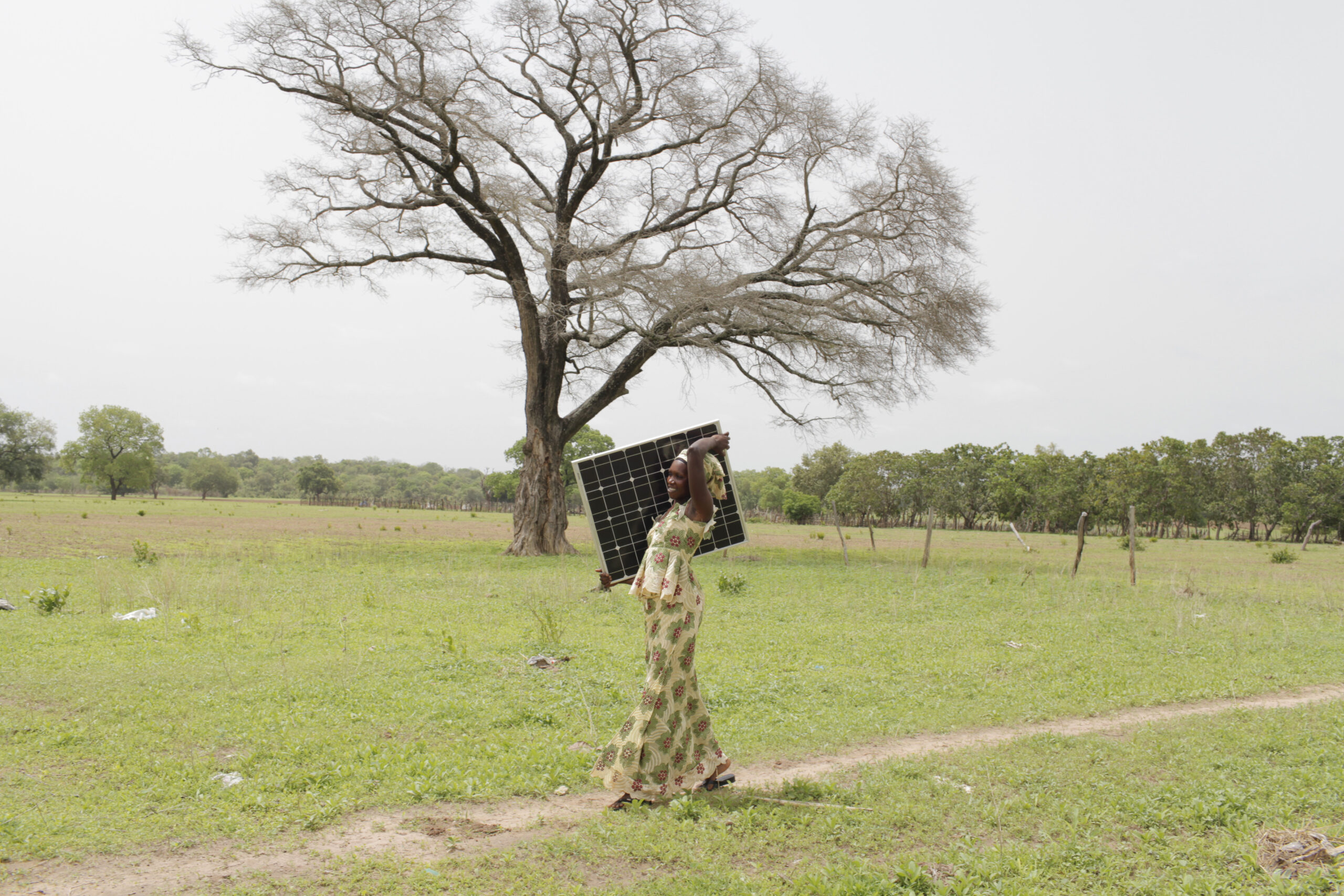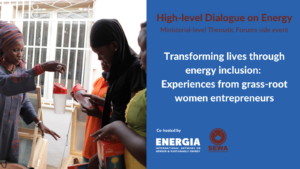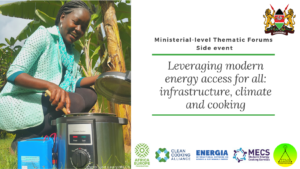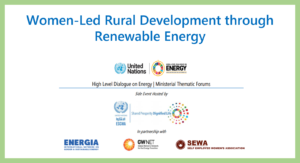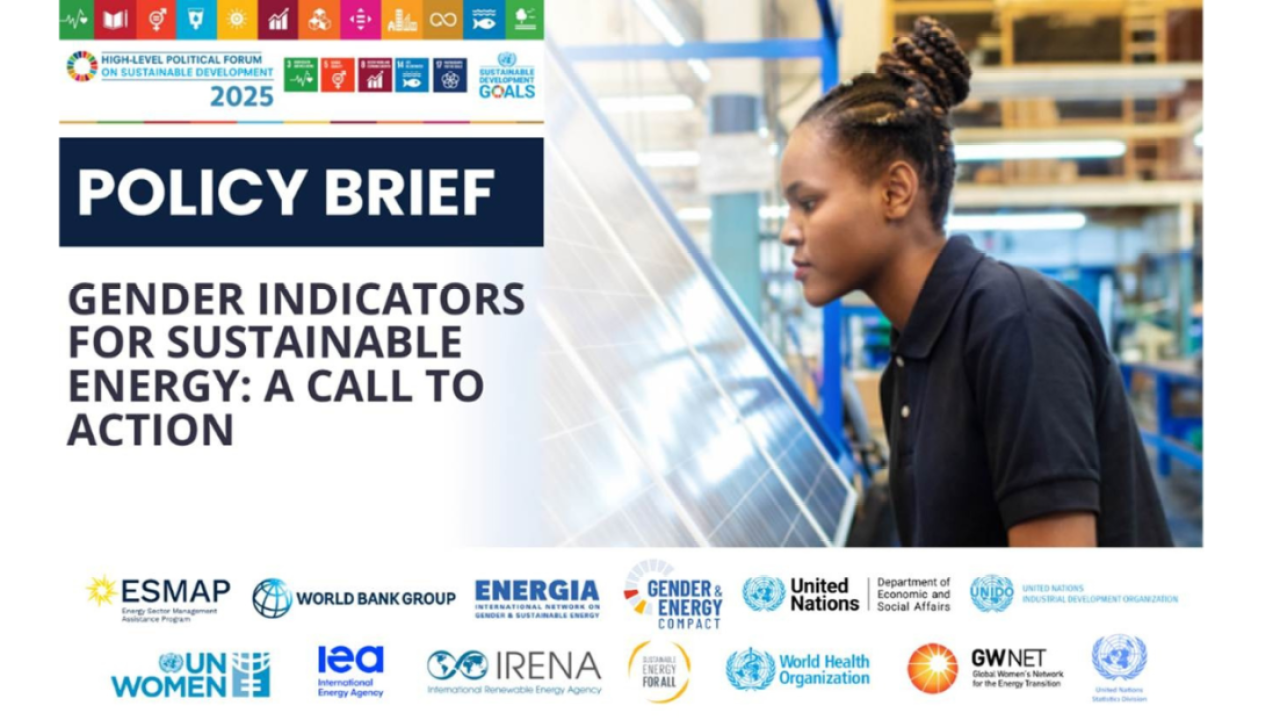UN Member States, NGOs, civil society, youth organizations and practitioners gathered last week for the Ministerial-level Thematic Forums, to discuss actions to promote and advance the achievement of the Sustainable Development Goal 7 and the Paris Agreement on climate change.
The event offered an opportunity to outline challenges and encourage dialogue by bringing to the table a variety of stakeholders, discussing the five topics of the upcoming High-level Dialogue taking place in September 2021. Addressed over 5 days, the themes were: energy access; energy transition; enabling SDGs through inclusive, just energy transitions; innovation, technology and data; and finance and investment.
As expert on the nexus between energy and gender, ENERGIA supported, highlighted and contributed to the gender track during the event. Our program managers and experts participated in Ministerial Forums, Multi-stakeholder Dialogues and Side Events as panelists, co-organizers and presenters, to highlight the crucial role of women in the energy transition. In the side-events we co-hosted, we created space for grassroot women energy entrepreneurs, who are critical in changing the energy environment in rural areas, to share their contribution to the discussions, we analyzed the interlinkages between gender (SDG 5) and energy (SDG 7), and highlighted the crucial role of clean cooking in achieving universal and inclusive energy access.
Gender and clean cooking are often overlooked in the energy process and fail to be addressed at global level. The Ministerial-level Thematic Forums brought the opportunity to draw attention at the highest level and maintain political momentum around these two issues in the run-up to this year’s pivotal events, including The High-Level Political Forum, the UN Decade on Sustainable Energy for All, the High-level Dialogue on Energy, and COP 26.
“With the 2030 deadline for achieving universal energy access, just 9 years away, we need ambitious commitments and to ensure that our efforts reach the least attractive markets, and those with the slowest progress to date towards universal clean cooking, particularly in Sub-Sahara Africa” stated Sheila Oparaocha, ENERGIA’s International Coordinator and Program Manager, during the Global Multi-Stakeholder Dialogue “Achieving Universal Access to Clean Cooking Solutions”
Women at the heart of the energy process
Universal clean cooking and energy access cannot be achieved without women being decision makers, co-investors, and providers of clean cooking solutions and energy services. Despite progress, women struggle to have their needs, ambitions, and concerns heard. Women are often underrepresented at all levels and this prevents them from actively contributing to decisions.
To make the Ministerial Forums of the UN High-level Dialogue on Energy a truly inclusive platform, ENERGIA together with the Self Employed Women’s Association (SEWA) facilitated the participation of women entrepreneurs from Africa and Asia during the side event “Transforming lives through energy inclusion: Experiences from grass-root women entrepreneurs”. Women entrepreneurs discussed and shared their journey as entrepreneurs in the energy sector, pointing out the benefits that energy access has brought for their families and communities and the challenges that they faced to advance in terms of business growth and consideration. Silvia Sartori, ENERGIA’s Program Manager, who moderated the session:
This event provides a very interesting first-hand account of how – not just energy inclusion – but access to renewable energy – can have a transformative impact on women, their families, their businesses and their communities.
ENERGIA believes that these experiences on the ground can guide our actions and decisions, and have a ripple effect in those places where policies and strategies are planned. To be effective, inclusive, fair and sustainable in the long-term, energy policies and projects should be designed assessing and addressing women’s and men’s needs.
“Representation and engagement of women is a precondition for the transition to be truly inclusive and to have more chances to be really fair,” stressed again Silvia Sartori during the session “Women-led rural development through renewable energy”, organized by by The United Nations Economic and Social Commission for Western Asia (ESCWA), in partnership with The International Network on Gender and Sustainable Energy (ENERGIA), The Global Women’s Network for the Energy Transition (GWNET), and the Self Employed Women’s Association (SEWA).
“In addition, the energy transition can be more inclusive and fair only if gender is mainstreamed throughout its roll out. This means that the implications of the energy transition on women as well as the role that women may play along the process, shall be assessed from the very beginning and monitored and analysed throughout the transition” explained Silvia Sartori “Mainstreaming gender into the energy transition would then produce two main advantages: first, the needs, talents and views of women would be integrated into the process. Secondly, any potentially negative, unintended impact of the transition on women, could be averted or minimized,” she concluded.
According to Soma Dutta, ENERGIA’s Senior Technical Advisor, who discussed the interlinkages between gender and energy during the event “Advancing Energy (SDG 7) and Gender Equality (SDG 5)”, “Where gender and energy policies are in place, it is important that these are operationalized and that strong accountability measures are designed and implemented, that link SDG7 to SDG5: energy access to every aspect of women’s empowerment”.
Placing clean cooking on the international agenda
Despite positive changes, clean cooking is still being left out of energy planning and globally more than 4 billion people lack access to modern energy cooking solutions. Because of their role as household cooks, women and girls are the most affected by this. Joint action on clean cooking and climate is crucial to achieve sustainable development, gender equality and tackling the climate emergency.
Hon. Kadeh Yumkella, Former United Nations Under-Secretary-General and the first Special Representative of the Secretary-General for Sustainable Energy for All, made it clear during our side event “Advancing Energy (SDG 7) and Gender Equality (SDG 5)”:
It is time to prioritize clean cooking and take action. The lack of access to clean cooking is a silent tsunami, killing women and children.
Women should not only be included, but should also actively influence, participate in, and provide guidance to technologies, fuels, market and financing mechanisms that we design and promote.
Multilateral banks and the private sector should step in with their investments and the international community should work towards making these investments attractive in the long-term. These actions require comprehensive, effective and far-reaching strategies that promote women’s inclusion from the very first stages.
“Women are not just consumers. We need to make young women aware of the career opportunities in the sector, and provide mentorship and role models, training and coaching, and create gender responsive workplace policies and practices”, urged Sheila Oparaocha “Given that so many women operate clean cooking enterprises particularly in last mile communities, we have to support their aspirations for business growth, wealth creation, and decent jobs”.
Call to action to the International Community: 40 60 by 2030
During the side event on “Leveraging modern energy access for all: infrastructure, climate and cooking”, we discussed electric clean cooking as one of the solutions to advance clean cooking technologies in rural areas. As progress has been made and infrastructures become more reliable and affordable, research on energy efficient appliances for cooking has shown that electricity used in energy efficient appliances is increasingly affordable for a significant proportion of the population and that even on weak grids, high power loads and reliability concerns can be mitigated.
To spur action, ENERGIA, together with our partners the Government of Kenya, the Africa Europe Foundation (AEF), Clean Cooking Alliance, Modern Energy Cooking Services (MECS) Programme and the Energy Nexus Network (TENN) set a challenge to the international community: 40 60 by 2030.
40 60 by 2030 has two major components. First, we call for a target of 40% for all households connected to grid or off-grid electricity to be using it for cooking by 2030. While SDG 7 progress reports show that seven hundred and sixty million do not have access to electricity, there are over 2 billion who do have an electricity connection and yet continue to cook with polluting fuels. While over 96% of households in developing Asia have electricity connections, less than 30% cook with modern energy. In Sub Saharan Africa, just less than 50% of households have some access to electricity and yet less than 10% have access to modern energy cooking.
Secondly, we call for a target of 60% of those utilizing modern energy for cooking, to be utilizing energy generated from low carbon sources by 2030. Cooking with polluting fuels accounts for 2% of carbon emissions but a much higher proportion of black carbon emissions. As modern energy systems pivot towards renewable energy technologies, the access to clean cooking can match an improved access to low carbon modern energy.
This is a rallying call to ensure that gains in modern energy access are inclusive of its use for cooking while working towards low carbon solutions. This will give health, gender, environmental, and economic gains.
Sheila Oparaocha, ENERGIA, International Coordinator and Program Manager
Watch recordings of the side events:


